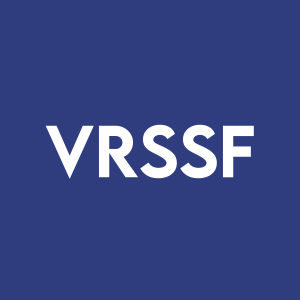VERSES® Welcomes IEEE Final Approval of Spatial Web Standards
Rhea-AI Summary
Positive
- First-mover advantage in implementing IEEE P2874 standards in commercial applications through Genius product
- Standards integration expected to reduce development time and lower integration costs for customers
- Potential for enhanced market adoption through standardized protocols similar to Wi-Fi and Bluetooth success
- Strategic positioning in the emerging field of AI system interoperability and governance
Negative
- Implementation timeline and costs for integrating standards into Genius product not specified
- Potential competition from other companies adopting the same standards
- Success depends on widespread industry adoption of P2874 standards
News Market Reaction – VRSSF
On the day this news was published, VRSSF gained 1.77%, reflecting a mild positive market reaction.
Data tracked by StockTitan Argus on the day of publication.
The company expects to be the first to implement standards in a commercial application with Genius™
VANCOUVER, British Columbia, June 04, 2025 (GLOBE NEWSWIRE) -- VERSES AI Inc. (CBOE: VERS) (OTCQB: VRSSF) ("VERSES'' or the "Company”), a cognitive computing company specializing in next-generation agentic software systems, welcomes the final ratification and forthcoming publication of the Institute of Electrical and Electronics Engineers Standards Association (IEEE-SA) P2874 Spatial Web standards intended to enable interoperability and governance between AI systems, agents, robotics and Internet of Things devices.
“Congratulations to the Spatial Web Foundation and the approximately three hundred P2874 working group participants who have worked diligently during the last five years to bring about this remarkable achievement. I believe that these global standards mark the dawn of the next era of the web,” said VERSES CEO, Gabriel René.
Just as past IEEE standards, such as Wi-Fi® and Bluetooth®, have catalyzed global device interoperability, the Spatial Web standards aim to standardize secure communication, collaboration, and control among AI agents, IoT devices, robots, digital twins, and human users in digital and physical environments.
One of the core standards, Hyperspace Modeling Language (HSML), provides for a shared multidimensional vocabulary for describing people, places, and things, while Hyperspace Transaction Protocol (HSTP) encodes permissions and policies into every digital interaction. Together, they provide both hardware manufacturers and software developers a common toolkit to reduce time-to-market, accelerate deployment, and lower integration costs, while empowering policymakers and regulators with a robust foundation for building safeguards that ensure systems interoperate intelligently, safely and ethically in the real world.
One critical challenge that the standards were designed to address for businesses is ensuring standard protocols for identity, credentials, and trust when AI interacts with IoT devices and robots. For example, a factory might want to specify that only authorised individuals or agents may instruct a robot to move certain components to or from approved parts of the building.
Consumers can determine how, when and where systems may use their data. For instance, an individual can share private medical information with a healthcare provider but ensure that the terms of use and access to their data remain under their control.
VERSES plans to support the P2874 standards in future releases of its product, Genius. This will enable enterprises to develop intelligent agents interoperate more easily and obey enterprise-defined policies and laws. For Genius customers, this can mean quicker development and deployment and lower integration costs.
“We believe that integrating Spatial Web standards into Genius will create more robust, agentic, and autonomous systems that can better understand their surroundings, coordinate with other IoT and robotic systems, and comply with technical, legal and business requirements,” said James Hendrickson, President and COO of VERSES. He added, “Imagine a warehouse robot rolling into a new facility, understanding the local policies, and starting to work within minutes with no custom coding required. That’s the future-ready world that our customers are demanding and that VERSES is working to deliver.”
More information can be found on the Spatial Web Foundation and IEEE websites:
https://spatialwebfoundation.org/spatial-web-foundation-announces-ieee-approval-of-spatial-web-standard/
https://sagroups.ieee.org/2874/
About VERSES
VERSES® is a cognitive computing company building next-generation intelligent software systems modeled after the wisdom and genius of Nature. Designed around first principles found in science, physics and biology, our flagship product, Genius,™ is an agentic enterprise intelligence platform designed to generate reliable domain-specific predictions and decisions under uncertainty. Imagine a Smarter World that elevates human potential through technology inspired by Nature. Learn more at verses.ai, LinkedIn and X.
On behalf of the Company
Gabriel René, Founder & CEO, VERSES AI Inc.
Press Inquiries: press@verses.ai
Investor Relations Inquiries
James Christodoulou, Chief Financial Officer
IR@verses.ai, +1(212)970-8889
Cautionary Note Regarding Forward-Looking Statements
This news release contains statements which constitute “forward-looking information” or “forward-looking statements” within the meaning of applicable securities laws, including statements regarding the plans, intentions, beliefs and current expectations of the Company with respect to future business activities and plans of the Company. Forward-looking information and forward-looking statements are often identified by the words “may”, “would”, “could”, “should”, “will”, “intend”, “plan”, “anticipate”, “believe”, “estimate”, “expect” or similar expressions. More particularly and without limitation, this news release contains forward–looking statements and information relating to the expectation that the Company anticipates listing its Class A Subordinate Voting shares for trading on Nasdaq; and other statements that are not historical facts.
The forward–looking statements and information are based on certain key expectations and assumptions made by the management of the Company. As a result, there can be no assurance that such plans will be completed as proposed or at all. Such forward-looking statements are based on a number of assumptions of management, including, without limitation, that the Company will successfully list its Class A Subordinate Voting shares for trading on the Nasdaq as anticipated by management. Although management of the Company believes that the expectations and assumptions on which such forward-looking statements and information are based are reasonable, undue reliance should not be placed on the forward–looking statements and information since no assurance can be given that they will prove to be correct.
Forward-looking statements and information are provided for the purpose of providing information about the current expectations and plans of management of the Company relating to the future. Readers are cautioned that reliance on such statements and information may not be appropriate for other purposes, such as making investment decisions. Since forward–looking statements and information address future events and conditions, by their very nature they involve inherent risks and uncertainties. Actual results could differ materially from those currently anticipated due to a number of factors and risks. These include, but are not limited to, that the Company will not successfully list its Class A Subordinate Voting shares for trading on Nasdaq as anticipated by management or at all and other risks detailed from time to time in the filings made by the Company in accordance with securities regulations. Accordingly, readers should not place undue reliance on the forward–looking statements and information contained in this news release. Readers are cautioned that the foregoing list of factors is not exhaustive.
The forward–looking statements and information contained in this news release are made as of the date hereof and no undertaking is given to update publicly or revise any forward–looking statements or information, whether as a result of new information, future events or otherwise, unless so required by applicable securities laws. The forward-looking statements or information contained in this news release are expressly qualified by this cautionary statement.








